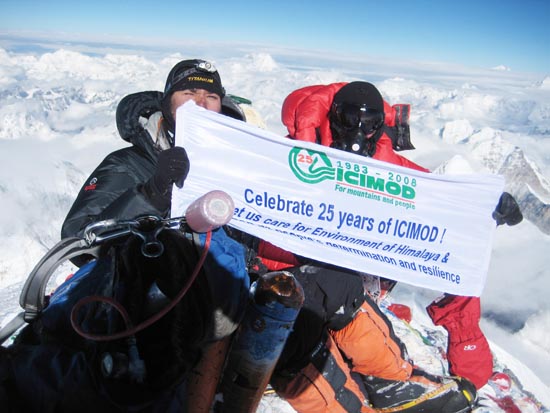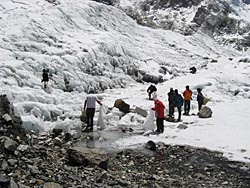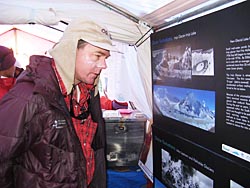Celebrating 25 years of ICIMOD
The 25th Anniversary of ICIMOD begins with waving of the ICIMOD flag on the top of Mt. Everest by Dawa Steven Sherpa on May 26, 2008 (Fig. 1), followed by many other events to be continued throughout the year - Paribesh Pradhan, Navraj Pradhan and Nonna Lamponnen

Fig. 1 Dawa Steven at summit of Mt. Everest
(photo courtesy of Asian Trekking)
Mountains cover one-fifth of the globe, and almost half of humanity depends on mountain ecosystems in one way or another. The Hindu Kush-Himalayan region is an integral part of the global ecosystem. This mountain region is rich in biological and environmental resources and serves as a water tower for the region. The nine Himalayan river systems originating from the high mountains provide the basis for livelihoods of over 150 million mountain people. In total they sustain the lives of over 1.3 billion people a fifth of the world's population. However, this environment is now under threat as a result of environmental degradation and climate change. The weather patterns in the region are becoming more extreme, and as a result the wet season is becoming wetter and the dry season drier.
The Himalayan mountain range is the home to a host of ethnic groups. All along the Himalayas, local communities are finding that their way of life is being threatened by changes in their environment. As industrial powers debate climate change, some experts say that some of the greatest concerns lie in the remote Himalayas, often called the "Water Tower of Asia" or "The Third Pole" because of the huge amount of snow, ice and water stored in the region. Although the Himalayan people hardly contribute towards global warming, it is having negative effects on the mountain communities and the fragile mountain ecosystem.
The International Centre for Integrated Mountain Development (ICIMOD) is an intergovernmental organization that since 1983 has been encouraging technical co-operation between governments in the region to help promote the development of economically and environmentally sound mountain ecosystems, and the lives of the mountain people. Over the past 25 years, ICIMOD has acted as an independent regional knowledge, learning, and enabling centre serving eight member countries (Afghanistan, Bangladesh, Bhutan, China, India, Myanmar, Nepal and Pakistan) in the HKH region, as well as the global mountain community. ICIMOD's long history of working in the region, its strategic position and comparative advantages place it in a unique position to make a significant contribution in helping the region to take on new challenges, most critically those related to climate change.
On December 5, 2008, ICIMOD will mark its 25th anniversary of working for mountains and people in the Hindu Kush-Himalayan region. ICIMOD is celebrating its silver jubilee with a year-long series of events focused on raising awareness of the effects of climate change and the need to enhance the adaptation and resilience of mountain communities. The last five years have seen an increased awareness of how climate change directly affects livelihoods, and natural hazards. ICIMOD is taking this opportunity to enhance its role in the region, and among global stakeholders, in promoting coordinated efforts to face the challenges of climate change. The celebrations are also about how we served and contributed to the region in the past, and our strong commitment to take on the challenges of climate issues of the Himalayan region in the future. ICIMOD continues to work closely with governments and other international partners.
The Eco Everest Expedition 2008 was one of the first among this series of events. It is a unique partnership combining mountaineering and scientific research. The expedition drew global attention to the issues of climate change and melting glaciers in the Himalayas. Dawa Steven Sherpa of Asian Trekking was the leader of the climbing expedition. He reached the top of Mount Everest on May 26, 2008 (Fig. 1). In conjunction with this, some scientific research was conducted on the Dig Tsho and Imja Tsho glacial lakes by ICIMOD's research team. The Eco Everest Expedition 2008 was conducted in partnership with Asian Trekking, ICIMOD and the United Nations Environment Programme (UNEP). For more information on the Eco Everest Expedition, please visit http://www.ecoeverest.net.np.
As part of this expedition, a trust fund was set up exclusively for community development in the Khumbu area of the Everest region to finance further research and monitoring of particularly dangerous glacial lakes. This fund also aims to finance clean-up campaigns and awareness-raising workshops among local communities regarding the risks of Glacial Lake Outburst Floods (GLOFs). A total of 965 kilograms of waste was also collected during the expedition (Fig. 2). A ten-point recommendation for an "Eco Code of Conduct" (ECC) was also field-tested during the expedition. This code was developed in co-operation with renowned mountaineers and various alpine associations around the world.
The Himalayas - Changing Landscapes photo exhibition was first unveiled at the Mount Everest base camp on April 18, 2008 making it the highest photo exhibition in the world (Fig. 3). Using photographs taken fifty years ago and those of the same place taken in 2007, the exhibition provides a striking visual impression of how climate change and glacial melting have affected the Himalayas in the past half century.
This year, the Himalayas - Changing Landscapes photo exhibition is making its journey across Europe, and beyond. The first European exhibition was held during the World Water Week in Stockholm (August 17 - 23, 2008). It will then move to Barcelona where it will be an outdoor exhibition during the IUCN World Conservation Congress (October 5 - 14, 2008). Further exhibitions in Kathmandu, Madrid, Bern and London will follow.
Another successful anniversary event was held in May. The "Mountains and People: Global Digital Photo Contest" was organized in collaboration with the Mountain Forum. A total of 1,100 photographs were submitted by 336 people. The themes of the contest were divided into four categories: Geophysical Elements, Culture, Hazards and Disasters, and Livelihoods.
The main celebration for ICIMOD's 25th Anniversary will take place from December 1 to 7 in Kathmandu, Nepal. Various events will take place during the week-long celebrations, including a high-level strategy seminar, opening of the photo exhibition, an ICIMOD open house day, special publications, field trips to various projects, and a grand gala dinner with distinguished international and regional guests.
These celebrations are aimed at increasing the awareness of ICIMOD and the work we do in the Hindu Kush-Himalayan region, and beyond. Additional awareness campaigns and in-house reflection in the contribution ICIMOD makes to the region and the global arena are also planned.
For information on ICIMOD and its 25th Anniversary Celebration, please contact Ms. Nira Gurung at: ngurung@icimod.org. You can visit ICIMOD's website at http://www.icimod.org

Fig. 2 Garbage Collection at Everest Base Camp
(photo courtesy of Paribesh)

Fig. 3 Photo Exhibition at Everest Base Camp
(photo courtesy of Paribesh)